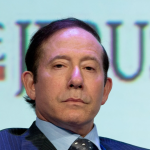
When Heather Breeze was in law school, she dreamed of a career helping people. She is now a successful family law barrister . Her road to success however was not a direct one.
Born in England and raised in Australia, Breeze comes from a professional family. Her father was a surgeon and Emeritus Professor at the University of New South Wales, and her uncle and brother are both surgeons. But Breeze took a different career route.
“I chose law at a very early age,” Breeze says.
After studying for a joint Bachelor of Laws and Bachelor of Economics at Sydney University, she was given an opportunity to travel and study, and she moved to the UK to undertake a Master of Laws at University College London.
Living at the Goodenough College in Bloomsbury — founded by Frederick Goodenough as a residence hall for Commonwealth postgrad students — Breeze had her first child and became the college’s social director.
“I became heavily involved in the music side of things because I’ve got a real passion for music,” she shares.
The siren call of music was so strong that while in London, Breeze took a couple of years off from her legal career to found and direct the Benjamin Britten International Violin Competition.
“We raised about £500,000. We had a first prize of £15,000 and a touring circuit with the world’s greatest orchestras,” says Breeze. “We had Sir Andrew Davis conducting the London Philharmonic at the Barbican on finals night.”
At Goodenough, Breeze also struck up a friendship with one of her college professors, who was a High Court judge. “He was an incredible mentor and became a close friend,” she says. And that changed everything.
Heather Breeze’s Chosen Path
While in London, and under the recommendation of her High Court mentor, she decided to become a barrister rather than a solicitor. In the UK and Australian legal systems, barristers are trial advocates, while solicitors broadly tend to the legal needs of clients out of court. She also elected to focus on medical malpractice as an area of expertise.
“But as it happens, I started getting brief after brief after brief in family law and care and protection law, which was not something I knew anything about. I didn’t even know where the court was,” Breeze recalls. She nonetheless found she was extremely good at family law, and her practice began to thrive.
In truth, she surprised herself.
“When I was practising medical malpractice and professional negligence, I turned my nose up quite squarely at family law and family law practice,” Heather Breeze says with a laugh.
But after a while, looking around the courts and seeing the need, she realised something.
“You know, it really needs good, good people,” she says of family law. “There’s an enormous amount of good that can be done in it. And when you’re working as hard as we all work, you need to generally know you’re really adding value.” Breeze freely admits that medical malpractise and family law are very different areas of law. But she does see certain similarities between the two practice areas.
“They’re both humanitarian areas of law,” she notes.
In injury and negligence cases, you’re faced with an injured plaintiff and that involves a level of distress, which drives the litigation.
On the other side of the litigation is the professional — like a dentist or a doctor — being sued, whose credibility and competence are being threatened.
“They have an extremely invested interest in defending their professional reputation,” says Breeze.
Looking Behind the Algorithm
Heather Breeze points out that one can’t ignore the fact that in the mix is the insurance company that insures the professional.
“The insurer takes an entirely commercial and pragmatic approach,” says Breeze, adding that insurers are generally more focussed on settling the litigation than they ultimately are about defending the reputation of their clients. “These are extremely different dynamics.”
Then there are the courts, which ostensibly have their own algorithms, like the range of damages and penalties that a court is willing and able to award.
In terms of the ways the courts handle both injury and family law, Breeze sees particular similarities.
“If you look at it a certain way, you have a range of time that a court might award with a child, as bizarre as that might sound. And there is a range of what is reasonable when you’re looking at property distribution in a divorce case,” Breeze observes. “You take that scientific and mundane and pedestrian algorithm, and you put it in the context of desperately upset people. It may sound cold, but the courts need to ensure they treat everyone fairly, and make it through their incredibly busy dockets.”
Heather Breeze Sees Humanity Behind the Court’s Numbers
In a negligence case, an injury at the hands of a professional, or some sort of medical malpractice suit, whilst desperately upsetting for the plaintiff is also desperately upsetting for the person who is asserted to have breached their duty of care.. Meanwhile, in family law, the explosion of a marital union — especially if children are involved — is also deeply upsetting to all parties.
Against the seemingly harsh workings of the courts, Heather Breeze makes sure she sees the humanity behind her client, her client’s children, and even her adversaries.
“The emotional regulation of parents and family law is something which the court tries to take into consideration, but often isn’t legislatively able to deal with. However the human element is something that can’t be ignored. It’s not realistic and it’s not natural,” she says. “I think my real strengths in terms of my practice area is an extremely strong focus and view of what I believe is objectively good for children.”
Tingey Injury Law Firm on Unsplash












